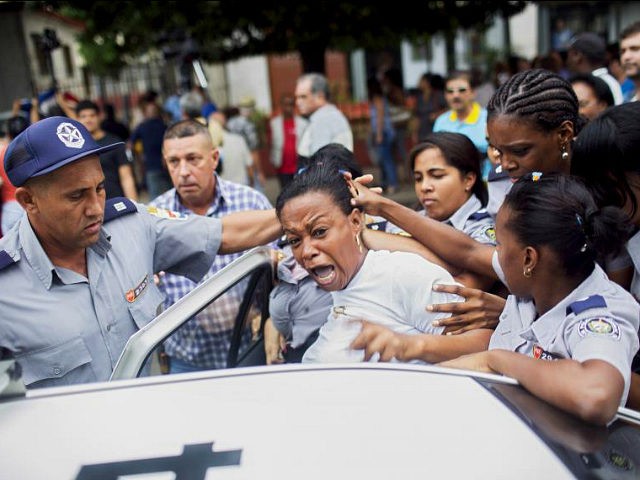The Cuban Observatory for Human Rights (OCDH), a non-governmental organization, testified before the United Nations on Thursday that the island’s communist regime had executed over 30,000 arbitrary arrests in the past five years.
Most of the arrests targeted political dissidents, journalists, and others who had openly opposed the Castro regime. Police never charged a vast majority of them, resulting in their repeated arrests, and observers have classified many of these incidents and violent in nature or, more specifically, instances of police brutality. This practice of arbitrary arrest, no accusations of criminal behavior, and release allows the Castro regime to keep its official tally of political prisoners low while restraining the freedom of some of its most prominent dissidents. Some members of the Ladies in White dissident group, for example — including leader Berta Soler — have been arrested on a weekly basis for months, but never charged with a crime.
The OCDH presented its documented evidence of politically motivated arrests before the U.N. Human Rights Council this week. Cuba is a member of the Human Rights Council and will keep its seat through at least 2023, despite the Human Rights Council itself confirming widespread, systematic human rights abuses on the part of the Castro regime.
According to the NGO, between January 2015 and June 2021, the Cuban Communist Party made 30,786 arbitrary arrests. A plurality — 16,764 to 14,022 arrests — were conducted against women, likely a reflection of the frequency with which the Cuban state uses police brutality against the Ladies in White. The group consists of the wives, sisters, mothers, and daughters of political prisoners, and its only act of protest is to attend Catholic Mass on Sundays dressed in white and carrying the images of their imprisoned loved ones.
“The detention of women is habitual,” the statement OCDH offered to the Human Rights Council read in part. “A significant number of those arrested are members of the Ladies in White, a women’s group that advocates from the liberation of all imprisoned for political reason and the respect for human rights and fundamental freedoms in Cuba.”
The OCDH noted that the greatest number of arbitrary arrests occurred during President Barack Obama’s tenure, during which he significantly weakened economic sanctions on Cuba and encouraged engagement with the repressive Castro regime. In 2016, Obama himself and his family visited Cuba, attending a baseball game with dictator Raúl Castro and enjoying other tourist activities. By the end of that year, Cuban NGOs had documented 10,000 arbitrary arrests, many of them occurring in the period immediately prior to Obama’s visit. Ladies in White leader Berta Soler was arrested eight times in March of that year, when Obama visited.
Arbitrary arrests declined during the tenure of President Donald Trump, who largely rescinded concessions to the Castro regime made under Obama. The Trump administration banned tourism cruises from the United States to Cuba, eliminated exploitable loopholes to the embargo such as the “people-to-people” travel exception for U.S. citizens, and restored Cuba to the official “State Sponsors of Terrorism” list. The latter designation was in recognition of the Communist Party’s ties to Hezbollah, Iranian government terrorist groups like the Islamic Revolutionary Guard Corps (IRGC), and Marxist groups like the Revolutionary Armed Forces of Colombia (FARC).
President Joe Biden has yet to address Cuba in his foreign policy whatsoever, leaving it essentially as it was under Trump.
The Cuban NGO concluded its accusatory statement noting that the Communist Party’s goal is to “discourage protests critical of the government, block the free expression of opinions and ideas, [the freedoms of] assembly, association, and other fundamental rights, as well as avoid the promotion and defense of human rights.”
The increasingly frequent use of arbitrary arrests has not resulted in Cuba phasing out the prolonged detention of political prisoners. Cuban Prisoners Defenders, an NGO that tracked convictions of Cuban civilians on politically motivated charges, has confirmed 205 individuals it identifies as political prisoners between June 2020 and Thursday. The organization noted that that number was 134 people in June 2020 and has increased by about six new political prisoners per month. Among those identified a year ago, 53 have been released, nearly all of them after having completed their prison sentences, meaning there are currently 152 still in prison.
In addition to the 152, Cuban Prisoners Defenders identified “another 11,000 civilians not belonging to opposition groups, 8,400 of them convicted and 2,538 condemned … on ‘pre-criminal’ charges.” This category refers to individuals explicitly convicted without being found guilty of having committed any crime, but posing a potential risk of doing so in the future according to the Communist Party.

COMMENTS
Please let us know if you're having issues with commenting.